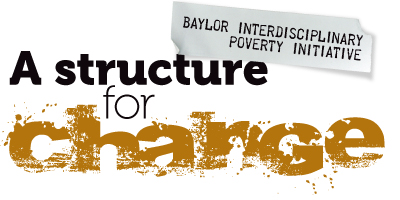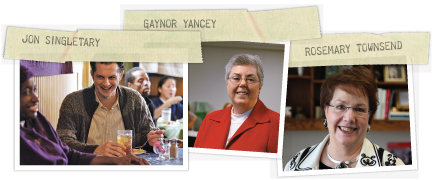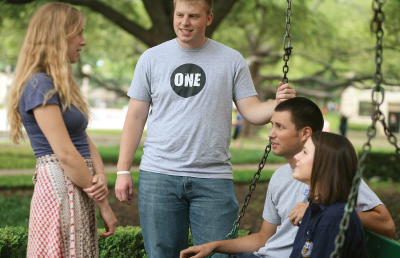Structure For Change
The collective passion for people in poverty that many Baylor students possess is built upon and fueled by the collective efforts of faculty and staff across the university.
Yancey and Townsend are part of a community of faculty and staff that has long been addressing poverty across various disciplines. Learning from past interdisciplinary efforts and best practices, these dedicated folks have established a sustainable strategic plan to mount a full-fledged attack on poverty: the Baylor Interdisciplinary Poverty Initiative (BIPI).
Formed in 2007 with initial funding from Bridgeway Capital Management of Houston, the BIPI is an interdisciplinary and multidisciplinary program "designed to create a catalyst for social change around issues of poverty, civic engagement, and social and economic justice." Administered by the Division of Student Life, the BIPI is led by project coordinator Rosemary Townsend and faculty advisors Dr. Gaynor Yancey and Dr. Jon Singletary, BA '93. The BIPI's advisory board further consists of faculty and staff from diverse disciplines-from nursing, education, business and engineering to anthropology, journalism and political science.
The BIPI has already provided significant opportunities for dialogue through two conferences this past fall, including the inaugural Poverty Summit held in October.
Perhaps the most exciting endeavors initiated this year are the opportunities for discipline-based service learning, where students have utilized experience within their particular fields of study to launch two new "Partner Projects" supported by grants from the BIPI: Campus Kitchen and Open Table.
Waste not, want not
During the fall semester, a School of Social Work master practice class launched an effort to reclaim the massive amounts of unserved campus dining hall leftovers--usually thrown away--and utilize them to feed others.
The Campus Kitchen at Baylor project is part of a national program to feed the hungry and save food that would otherwise be discarded. Baylor's is the first Campus Kitchen in Texas and only the 13th in the country.
Singletary, an associate professor in the School of Social Work, was impressed with the work of the students in planning and executing the project so quickly.
"To watch our students take this campus from the kind of place that throws away an enormous amount of food, to actually creating a system where that food can be rescued and served through the proper channels, not just on campus but throughout the city, is phenomenal," says Singletary, himself a student at Baylor 20 years ago when the University started the first collegiate chapter of Habitat for Humanity.
Typically, just completing the application process can take a full year, requiring significant support, the proper logistics and an array of permits.
"For Baylor to create a Campus Kitchen project in one semester is a huge feat. I couldn't have imagined how to pull that off, and students have done that in a semester's time," says Singletary.
"It was really cool just to have the experience, to get out and do [the project] rather than just sit back and talk about what would happen in theory," says student Amanda Stilwell, BA '07, MSW '09.
Now run by more than 300 student volunteers, Campus Kitchen teams with Aramark, the company that manages Baylor's dining halls, and community organizations such as Caritas to prepare and deliver food every week to local shelters.
In her social work group, Stilwell says she was used to being around people openly concerned about poverty, but the overwhelming student response still caught her off guard.
"I was surprised by how many people wanted to volunteer, how quickly it caught on and how quickly people were interested in what we were doing. It's definitely neat when you find people in other majors and across campus who you might not typically think would be interested."
The students involved don't just deliver the food. "They also stay, they eat, they build relationships with the people that we serve," says Townsend. "And the students are making plans next fall to do nutrition education, like helping a family on food stamp assistance to make wiser nutritional choices, especially for those with small children. They're really thinking about how to be even more helpful."
A seat at the table
Junior Paige Panter has one, as do Rosemary Townsend, Gaynor Yancey and master in social work student Jane Upshaw. These are some of the dozen individuals from various fields who meet together weekly around an Open Table with Ginger, a Waco woman serious about getting out of poverty and becoming self-sufficient.
A collaboration in the truest sense, the Open Table brings together professionals from health care to education to finance, to offer expertise, counseling and services to someone who has chosen to take an active role in rebuilding his or her life.
Alumnus Joe Panter, BBA '78, and his daughter, Paige, have helped bring the new initiative to Waco from their home in Paradise Valley, Ariz.
"I was reporting to the Student Life advisory board about the exciting possibilities I thought the BIPI had for students, that we were looking for best practices that had potential for integrating a student's discipline with service learning and research," says Townsend.
After the meeting Joe Panter told Townsend about Open Table, a congregation-based movement in which a dozen church members of varied expertise bring one person or family from 'poverty to wholeness' in about eight months. Because Open Table is designed to work in congregations, Townsend determined it would be helpful to connect with her church, St. Paul' s Episcopal in Waco.
"As we have been in the process of working with this woman on her life plan, resources just amazingly spring up. We needed some legal assistance, and a very highly qualified local attorney said, 'Let me help you with that,'" says Townsend.
Townsend is helping to expand the Open Table movement throughout Waco and to other areas of Texas. Townsend and Yancey are looking at Baylor-based research opportunities centered on the organization.
And their experience?
"Absolutely amazing," gasps Townsend. "It's one of the most exciting things I've ever done. Because of the way in which the table is configured, all of the life skills that someone is going to need to make that transition are covered.
"[The Open Table] success rate has been amazing. And I think the wonderful secret is that while our family's lives are changing, so too are the lives of everybody on the table. It's transformative for every single person around that table.
"What's so powerful about that is, it's really not poverty maintenance, but it's moving people to true self-sustainability. It's so exciting to get to be a part of that."
And it's not just charity, says Paige Panter. "There's a really big emphasis on paying it forward. Every penny is kept track of, everything that's been given to the individual, and they're expected to pay it back at the end of the table. That money is then taken to support the church's next table for the next person."
Although Panter is the only undergraduate student involved with Open Table thus far, she thinks Baylor can play a vital role in spreading the word about this outreach.
"While it might be hard for a group of college students to have a table, what could be really significant at Baylor, what would be ideal, is partnering a college student with a church," says Panter. "For the church to restore a person's sense of community is, I think, the central focus of Open Table. To bring that to the college level, students can be effective in the community aspect.
"When you are taking an individual's life and going through the tiniest details, and getting things back on track, there's a lot of work to do, and it really does take a table of 12 individuals," says Panter. "I think all of them will tell you that it's the greatest thing they've ever done and the greatest lesson they've ever had on being a human."
Cohesive community
In addition to the new partner projects, the BIPI has also supported a number of research grants, a three-month international social work internship to Moldova, and the formation of a new poverty minor at Baylor, which is in the midst of the approval process.
Townsend says that because the strategic plan is based on the nationally recognized Shepherd Poverty Program at Washington and Lee University, the BIPI has been able to manage its growth and be very intentional about including all aspects of the University. And while she is proud of the BIPI's progress, she knows there is work yet to do.
"The BIPI provides the proper framework to address international, national and local poverty issues," says Townsend. "It's a comprehensive plan. There are many, many wonderful projects going on all over Baylor that address different aspects of poverty and social justice issues, but we have a format that is able to address all of those things in a cohesive manner."
Townsend is excited and fascinated that students are using the knowledge they have gained in classrooms across all majors to be of service. "And I know, I'm totally convinced, that when they leave here, that immediately they are going to be contributing citizens in their communities. And to me, that's very, very powerful, and it's what the Baylor mission is all about."


